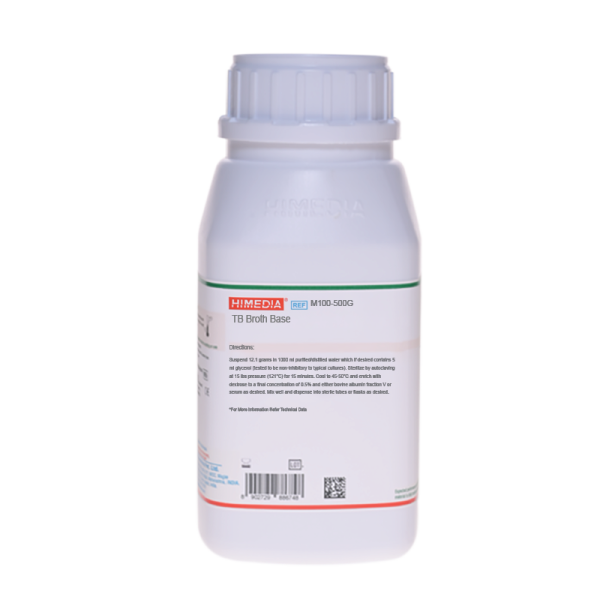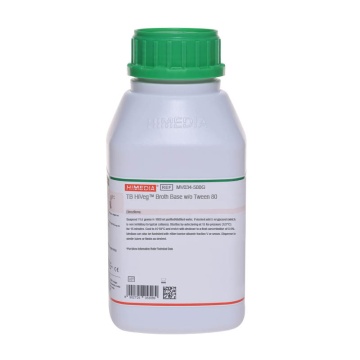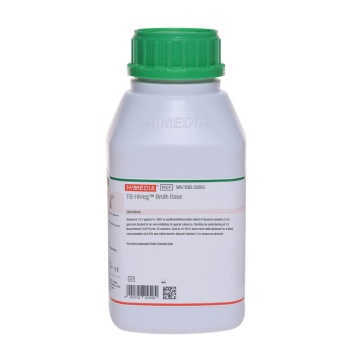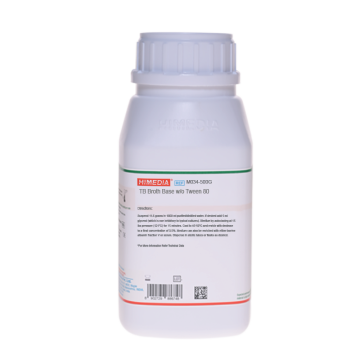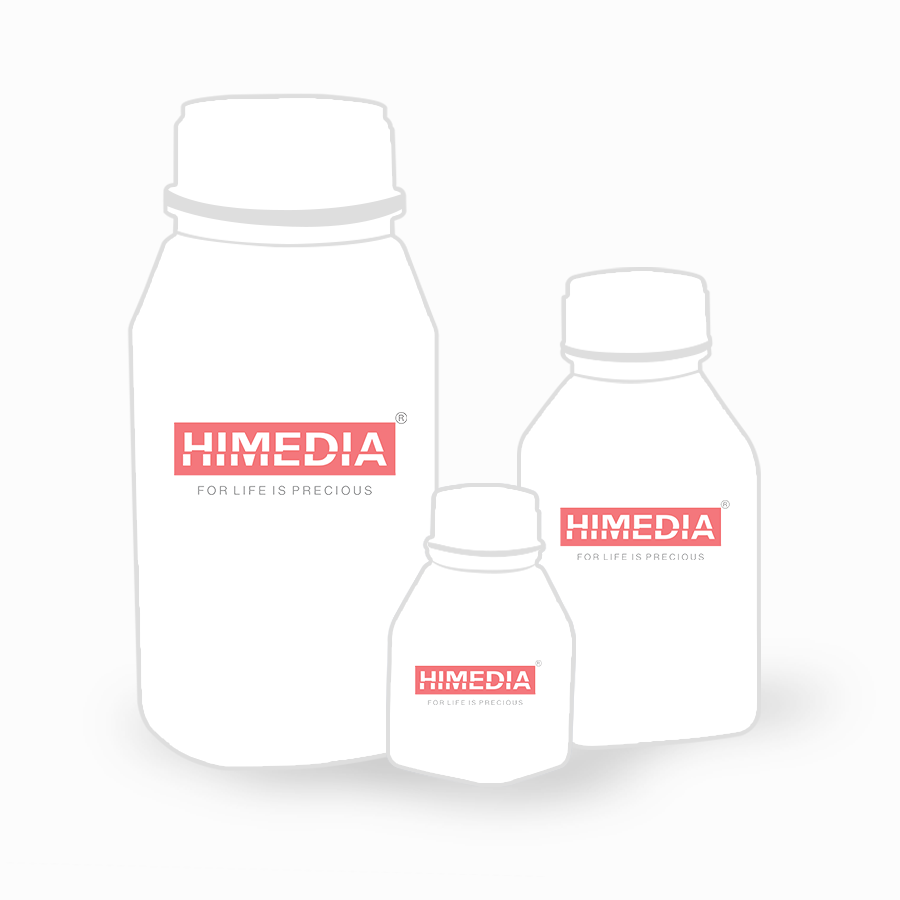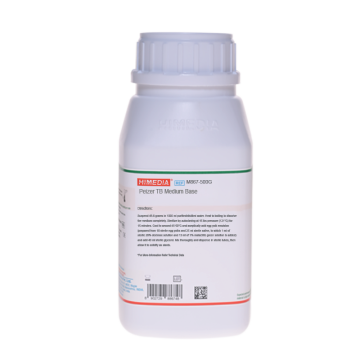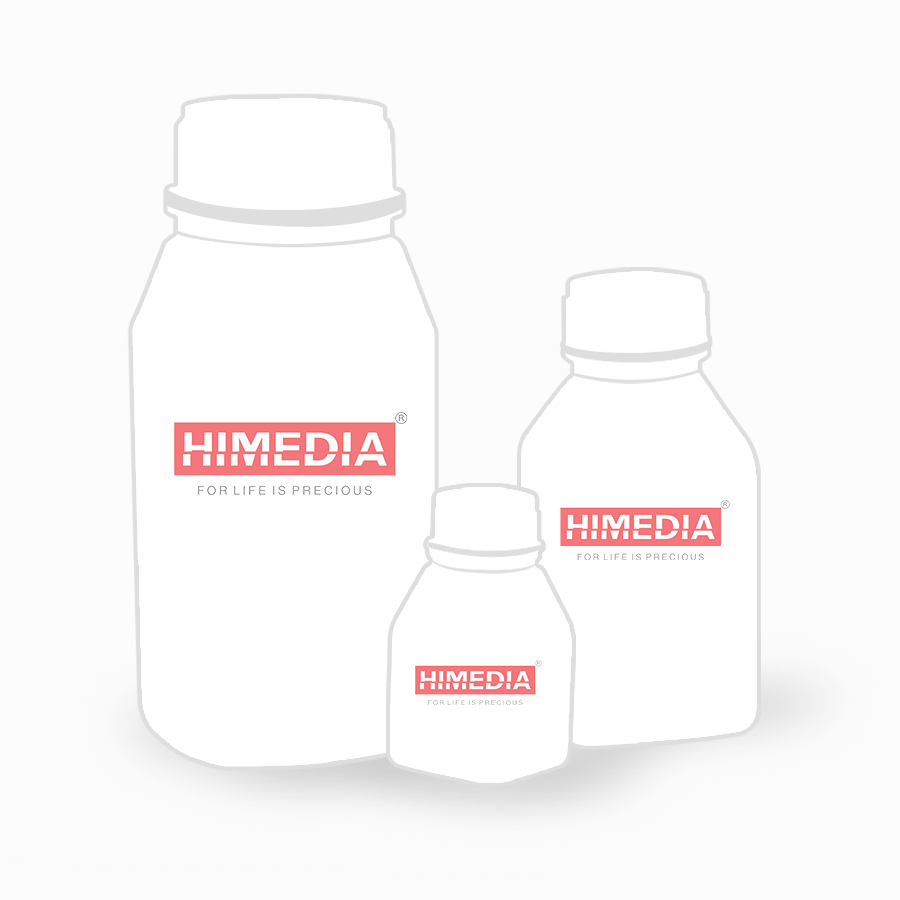 Your enquiry has been submitted
Your enquiry has been submitted
TB Broth Base
Non Egg Media#CC293D
Intended Use:
Recommended as a liquid medium for cultivation of Mycobacterium tuberculosis.
Composition**
| Ingredients | g/L |
|---|---|
| Proteose peptone | 4.000 |
| Yeast extract | 2.000 |
| Disodium hydrogen phosphate | 2.500 |
| Potassium dihydrogen phosphate | 1.000 |
| Sodium citrate | 1.500 |
| Magnesium sulphate | 0.600 |
| Polysorbate 80 (Tween 80) | 0.500 |
Final pH (at 25°C): 7.0±0.2
**Formula adjusted, standardized to suit performance parameters
Directions
Suspend 12.1 grams in 1000 ml purified/distilled water which if desired contains 5 ml glycerol (tested to be non-inhibitory to typical cultures). Sterilize by autoclaving at 15 lbs pressure (121°C) for 15 minutes. Cool to 45-50°C and enrich with dextrose to a final concentration of 0.5% and either bovine albumin fraction V or serum as desired. Mix well and dispense into sterile tubes or flasks as desired.
Principle And Interpretation
TB Broth media are based on the medium formulated by Dubos and Davis (1) and are used as liquid media for the cultivation of Mycobacterium tuberculosis. This medium provides dispersed growth of tubercle bacilli which is free of excessive clumps and so it can be used to prepare a uniform suspension of Mycobacteria. The medium can be used without additives and supplements; however, sterile dextrose and sterile serum can be added for the enrichment. Glycerol addition helps in the cultivation of Mycobacterium tuberculosis though some bovine strains are inhibited by it. Proteose peptone and yeast extract provide nitrogenous and carbonaceous nutrients, long chain amino acids and peptides, vitamin B complex and other essential nutrients. The medium is well buffered by phosphates. The salts present in the medium supply ions required for the mycobacterial metabolism. Sodium citrate inhibits gram-positive organisms and coliforms. Polysorbate 80, an oleic acid ester provides essential fatty acids for the replication of Mycobacteria.
Type of specimen
Clinical samples - Sputum sample
Specimen Collection and Handling:
For clinical samples follow appropriate techniques for handling specimens as per established guidelines (2,3).
After use, contaminated materials must be sterilized by autoclaving before discarding.
Warning and Precautions :
In Vitro diagnostic Use only. For professional use only. Read the label before opening the container. Wear protective gloves/ protective clothing/eye protection/ face protection. Follow good microbiological lab practices while handling specimens and culture. Standard precautions as per established guidelines should be followed while handling clinical specimens. Safety guidelines may be referred in individual safety data sheets.
Limitations :
- Further biochemical and serological tests must be carried out for further identification.
Performance and Evaluation
Performance of the medium is expected when used as per the direction on the label within the expiry period when stored at recommended temperature.
Quality Control
Appearance
Cream to yellow homogeneous free flowing powder
Colour and Clarity of prepared medium
Yellow coloured clear solution without any precipitate.
Reaction
Reaction of 1.21% w/v aqueous solution at 25°C. pH: 7.0±0.2
pH
6.80-7.20
Cultural Response
Cultural characteristics observed after an incubation at 35-37°C for 2-4 weeks.
| Organism | Growth |
|---|---|
| Mycobacterium kansasii ATCC 12478 | luxuriant |
| Mycobacterium smegmatis ATCC 14468 | luxuriant |
| M. tuberculosis H37RV (25618) | luxuriant |
Storage and Shelf Life
Store between 10-30°C in a tightly closed container and the prepared medium at 2-8°C. Use before expiry date on the label. On opening, product should be properly stored dry, after tightly capping the bottle in-order to prevent lump formation due to the hygroscopic nature of the product. Improper storage of the product may lead to lump formation. Store in dry ventilated area protected from extremes of temperature and sources of ignition. Seal the container tightly after use. Product performance is best if used within stated expiry period.
Disposal
User must ensure safe disposal by autoclaving and/or incineration of used or unusable preparations of this product. Follow established laboratory procedures in disposing of infectious materials and material that comes into contact with clinical sample must be decontaminated and disposed of in accordance with current laboratory techniques (2,3).
Reference
- Dubos and Davis, 1946, J. Exp. Med., 83:409.
- Isenberg, (Ed.), 1992, Clinical Microbiology Procedures Handbook, Vol. I, ASM, Washington, D. C.
- Jorgensen, J.H., Pfaller, M.A., Carroll, K.C., Funke, G., Landry, M.L., Richter, S.S and Warnock., D.W. (2015) Manual of Clinical Microbiology, 11th Edition. Vol. 1.
| Product Name | TB Broth Base |
|---|---|
| SKU | M100 |
| Product Type | Regular |
| Physical Form | Powder |
| Origin | Animal |
| Packaging type | HDPE |
| References | 1. Dubos and Davis, 1946, J. Exp. Med., 83:409. |
| Customized Product Available | No |



